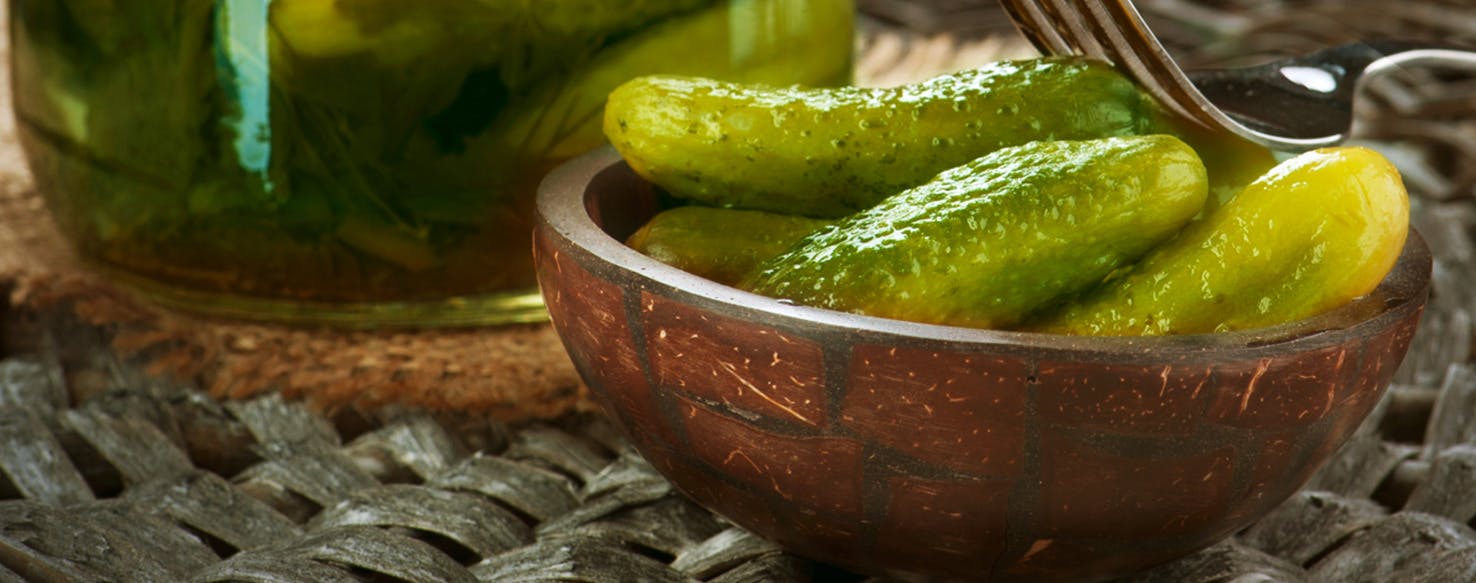
By Amy Caldwell
Published: 09/13/2017, edited: 08/10/2021
Save on pet insurance for your pet
You don't have to choose between your pet and your wallet when it comes to expensive vet visits. Prepare ahead of time for unexpected vet bills by finding the pawfect pet insurance.
We hear, all the time, conflicting information on what dogs can eat and what they should not eat. Often, information is sketchy at the least and unclear. A whole food diet for your dog is perfectly fine. Scraps given from the table or allowing your dog to eat every one of your meals with you may not be the best of choices. With fruits and vegetables, feeding dogs can be a little tricky. They can have carrots and apples, but they cannot have grapes or avocados. Sometimes it can be overwhelming knowing what foods you can give your dogs and what foods, like chocolate or cherries, could potentially be something their bodies will not be able to digest or could make them sick. What about pickles? Can your dog and should your dog eat pickles? There are a few things you should consider before giving your dog any table foods.
Nutritional Value
Dogs, unlike humans, don't often eat without reason, unless they are mischievous. Vegetables and fruits for your dogs are great choices. Though some fruits and vegetables are unsafe for your dog, cucumbers are not one of them. Your dog can eat cucumbers in a raw or cooked state. Your dog could even eat cucumbers in a pickled state. Pickles are safe for your dog to consume. However, they do not have any nutritional value for your dog. The cucumbers themselves are an excellent source of potassium and magnesium and vitamins C and B, including biotin. Your dog needs well-rounded meals with a balance of protein, healthy fats, and carbohydrates. Pickles do not really add nutritional value to your dog’s diet.
Sodium
Even though pickles are safe for your dog, they have very little nutritional value and they are typically high in sodium. While an occasional pickle slice will not harm them, there is no benefit in your dog ingesting extra sodium. Typically, your processed dog food will have enough sodium alone for your dog's required daily intake. Because of the way pickles are processed, meaning the pickling part of producing pickles, your pooch could be subjected to high sodium content as well as additional spices that could upset the tummy. Additionally, vinegar may cause stomach discomfort.
Pickles with Onions and Dill
Dill as a seasoning alone could help an upset tummy feel better. However, giving your dog dill pickles to make their tummies feel better is counterproductive because of the amount of sodium and vinegar found in pickles could potentially upset your dog's stomach. Pickles made with onions or pickles found in foods that your dog may eat which are made with onions, such as a hamburger or leftover soup, can become toxic to your dog. Onions alone are known for causing a specific anemia in dogs. So, even though pickles are safe, if they are prepared with onions or mixed in with food with onions, avoid giving them to your dog because the onion itself may become more of a problem than the pickled cucumber.
Probably Not Dangerous, But Not Beneficial
We often give our dogs treats and snacks as a reward for good behavior or while training. Some dog owners give dogs treats out of love and just because we know our furry companions will enjoy them. Pickles, however, do not have any nutritional value and don't offer your dog vitamins and minerals that they cannot get somewhere else. Pickles are high in sodium and could potentially be processed with other food such as onions, vinegar, or spices that may irritate your dog's stomach. So, you should not be too concerned if your dog has eaten a pickle or two or sneaks a pickle off your plate, but it is not a treat you will want to give your dog often.
You may also like
